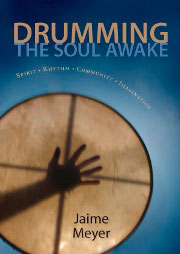How to be spiritual but not religious
 Monday, September 8, 2014 at 03:37PM
Monday, September 8, 2014 at 03:37PM  When people say they are spiritual but not religious (SBNR) what they often mean is they don't want to be told what to believe. They want to discover for themselves what is sacred. They reject what I call the obedience model in which the story of the universe and your place in it is told to you and you are urged or compelled to believe it and to follow the other moral or behavioral dictates of the ones who control the story. The obedience model rests on threat, and that is a very small place for God to live, especially a God of love.
When people say they are spiritual but not religious (SBNR) what they often mean is they don't want to be told what to believe. They want to discover for themselves what is sacred. They reject what I call the obedience model in which the story of the universe and your place in it is told to you and you are urged or compelled to believe it and to follow the other moral or behavioral dictates of the ones who control the story. The obedience model rests on threat, and that is a very small place for God to live, especially a God of love.
SBNRs embrace what I call the experience model - they want to discover for themselves and (crucially) experience the sacred directly. SBNRs want to decide if what they have witnessed for themselves, what they have felt and learned is real, viable, usable, beautiful, and helpful to them as they try to make meaning of their lives, right now, today.
The conundrum for SBNRs is trust. On the wandering path of experience, how does one trust which of their experiences are sacred and which are the wish fulfillment of the Freudian Id? Which are ego-driven affirmations of personal power and which are actual contact with Spirit? The number one question asked to me by scores of students of shamanism over the years is "how do I know I'm not just making stuff up?" This question is not unique to our modern time or to SBNRs. It's one of many perennial questions asked by the spiritual seeker.
My answer is four-fold.
First, know that all of our experiences are filtered through our ego and through our culture (what the German theologians call our sitz im leben, our social location in time and culture). We always need to be on guard against the ego, the small self, the false personality, the deceiver, the Nafs-al-Amara - the names are endless for that part of us that seeks power, status, and advancement for ourselves instead of wisdom and service for the world.
Second: Find a trustworthy non-human teacher. The angel, the higher self, the power animal, the ancestor, the writings (scripture, poetry, story, writings). Feel in your abdomen and your heart energy centers - not just in your mind - when you have complete trust of this teacher. Belief is a mental activity - an "assent" which means a yielding, a giving in against doubt. Trust is a belly energy, a function of the enteric nervous system, sometimes called the "second brain."
Third: being in a community of seekers helps regulate us when we go off the rails, as we all do at times. A true spiritual life comes from our actions aligning with our spiritual words. Hypocrisy is the constant shadow companion of the spiritual seeker. When we become inflated, misguided, or under the influence of the ego, the community is there to tell us so. The community who knows you is best able to tell you when your actions and your words don't align. Being chastised with love by a community is one of the hardest things we can experience, but it can also save us a great deal of grief.
Fourth: finding a human teacher that you trust is very helpful. Reading books is one thing. Doing work on your own is another thing. Working with guiding spirits is another thing. But having an actual human teacher who is farther down the path than you is helpful. Find a teacher who readily admits the mistakes they've made, who admits to their gaps, and who pays homage to and gives credit to their own human teachers. Find a teacher with a sense of humor about themselves and their spiritual path. The day we stop laughing at ourselves is the day we become dangerous to the world, and this applies double to spiritual teachers.
The blend of these four elements will help guide you into a path that gives you the best chance at growing and deepening, living with the best alignment of words and actions, and becoming a person whose spiritual life brings love, beauty and health to the world.

Reader Comments (2)
We are talking about a Mobile Root android app that roots your android device.
Cheat Droid Android Download